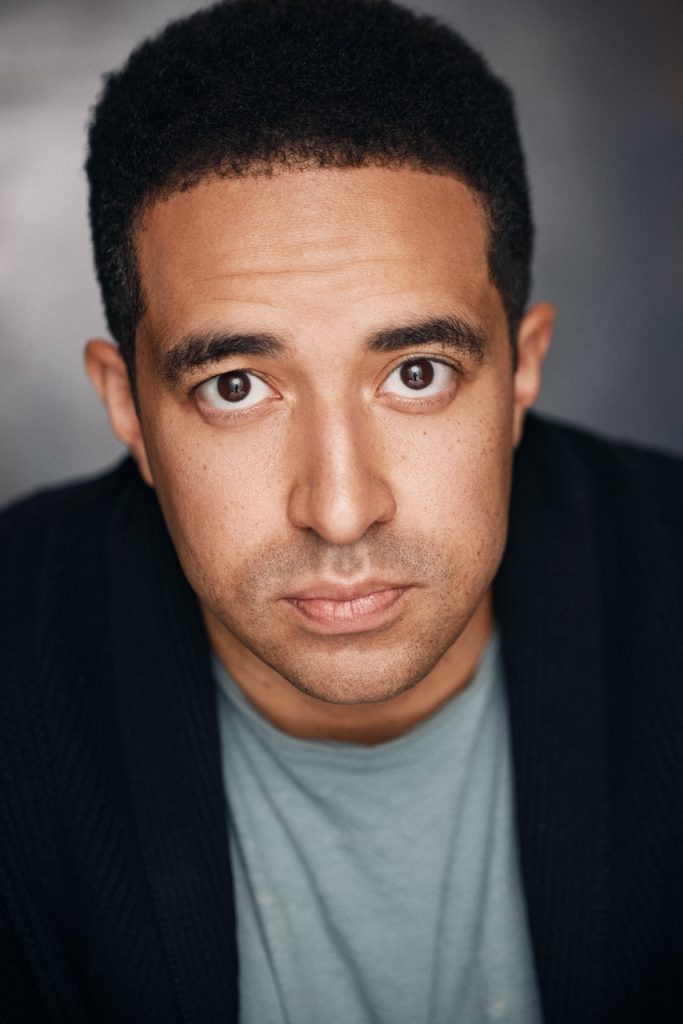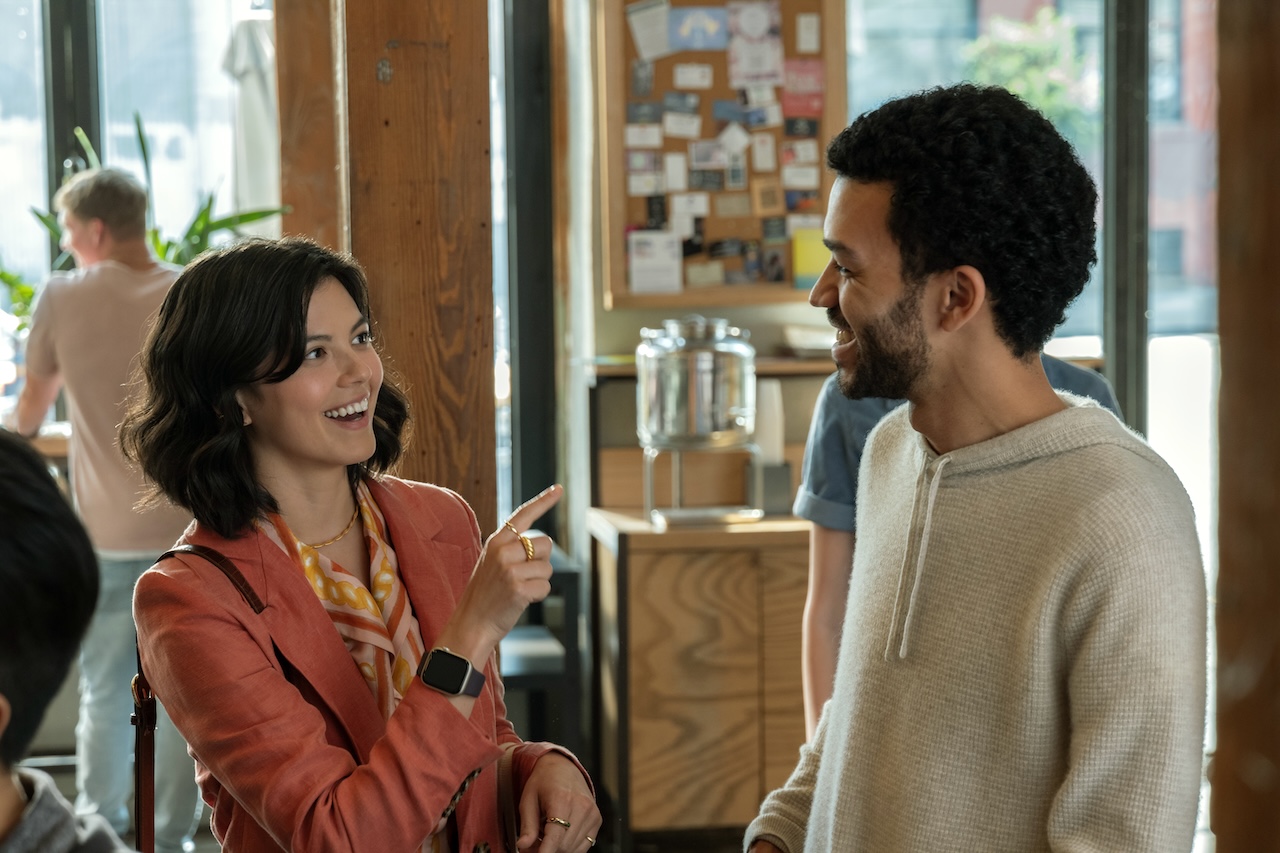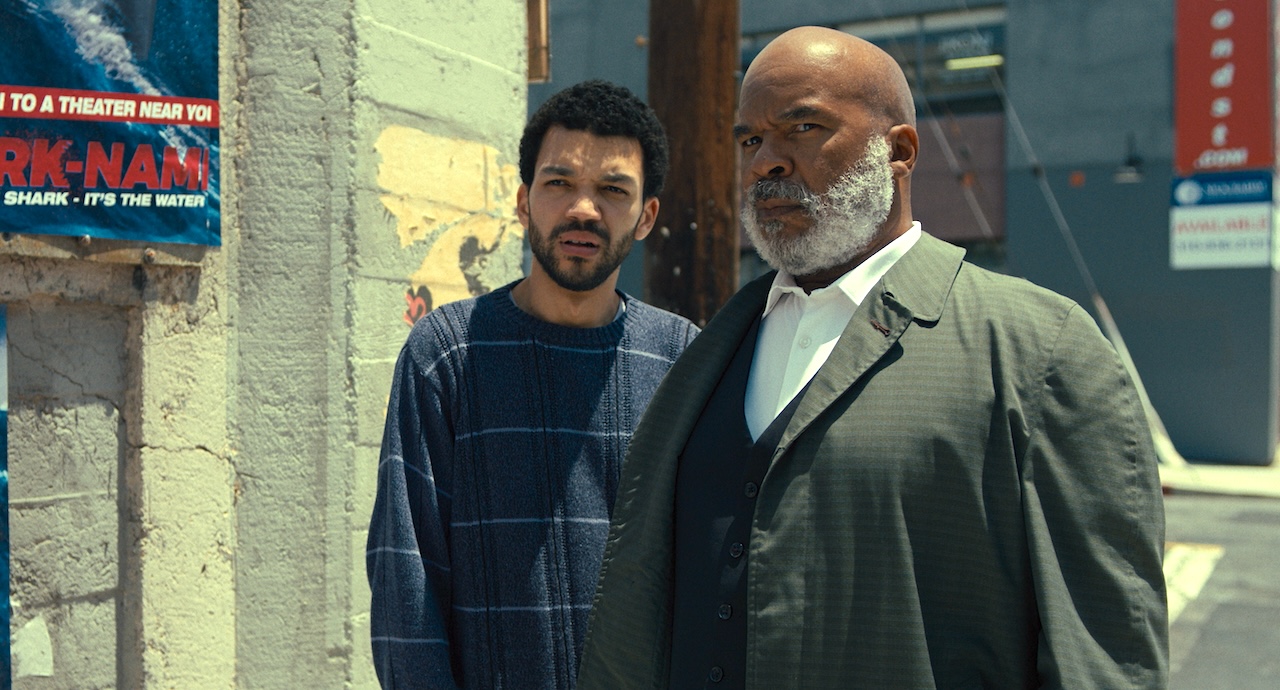Magical Negroes are highly-accommodating literary black characters whose sole raison d’être is to make white people feel important and comfortable. Their value is defined by how well they edify white people rather than having any innate right to self worth and self determination.
Are they mythical fairies or very real dark demons? “A little bit of both,” wryly jokes screenwriter Kobi Libii about his razor-sharp satirical comedy starring Justice Smith as Aren, An-Li Bogan as his love interest Lizzie, and David Alan Grier as Roger, his wizard guide.
The playful tone of the title reveals an underlying canvas of behavioral code-switching and assimilation faced by many black people. Such experiences were all too prevalent in Libii’s life that he describes as “an indictment on America.” He often felt unable to fully function as his authentic self, let alone thrive.
Kobi flipped the literary trope on its head to create an absurd, gonzo, comedy film based on the premise of, “What if magical negroes were real?” to hammer down his point. Therein lies the metaphor for the American Society Of Magical Negroes.

Kobi Libii. Photo by Nogen Beck
Aren is inducted into the Secret Society and does his best to serve. “His superpower is white people pleasing,” says Libii.
“They are advocating a very particular way of moving through the world that I have empathy for, because especially for an older generation of black people, they had to do what they had to do to survive, and I have some empathy for that,” continues the filmmaker.
Kobi Libii isn’t satisfied living in constant self-preservation mode because there is still so much ambivalence and criticism about black people having their own agency.
Genesis Of The Project
Magical Negroes was developed in two Sundance Labs – writing and directing. Kobi initially envisaged it as being a short form comedy sketch rather than a feature film. After he completed the writer’s lab, Libii wrote the first feature length draft of his script. The main angle was a stronger focus on the dark demons than the playful goblins getting into mischief. “I let them be a little more evil.” The filmmaker had a change of heart because he had so much empathy for folks in Roger’s generation who were often overlooked and ignored.
“I ended up swinging back to the more ambivalently critical, but ultimately forgiving, attitude of the film,” he contends. Some may consider this a sellout by not explicitly denouncing these magical negroes, but this pivot gave him conviction and clarity.
“If they’re either unambiguously heroic or unambiguously villainous, it’s much cleaner and easier. There’s a Monsters Inc. version of the story where Aren’s pulled into the society, we find out the society’s evil, and he resists.”
“There’s a Harry Potter version where he’s pulled into the society, there’s some other villain, but the society’s unambiguously good. Those versions of it are pretty clean and straightforward. The thing I’m doing is trickier,” explains Kobi.
Romancing The Tone
Magical Negroes rotates between gut wrenching drama and jaw dropping comedy as the society recruits Aren to execute its high stake mission. There is also a healthy infusion of magical realism where these negroes can zap themselves into another place in an instant.
“The tonal ambition of the film is how it made sense in my head,” says Kobi. He describes himself as a funny guy who uses comedic vocabulary daily.
Comedy is a potent instrument to convey hidden sadness. “At the end of the day, I’m writing about a very particular defence mechanism that I was taught as a black man about how to navigate America. It is pretty tough and quite embarrassing to raise my hand and admit some of the things, the points of view, that my protagonist Aren has, I’ve had at earlier points in my life. So, the comedy helps make that conversation possible as a person disclosing this, and also, for an audience in digesting it as well,” Kobi adds.
The wholly-palatable suspension of disbelief of giving magical negroes a physical form elevated the comedy. Libii pushed their comedic boundaries with their deadpan zaniness. The whole story is crazy because such an outlandish idea is even more so because it’s rooted in harsh reality.
Paradoxically, the world in The American Society Of Magical Negroes is exaggerated to make it feel more real. Kobi attributes this approach to his sketch comedy roots.
“You start breaking reality, then you get into sketch comedy mode with absurdism and surrealism. But purely comedically, you can’t invest in a world, and you can’t have stakes to your story, if you don’t believe there’s anything real there.”
Magical Negroes, isn’t built on an endless stream of jokes. “In a lot of ways, the work was in suppressing the comedy.”
There were many extended, improvised scenes which didn’t make the final cut. There’s a ten-minute reel of DeDe (Nicole Byer), the head of the society, and a handful of cringeworthy jokes by Rupert Friend who plays Mick, the CEO of MeetBox – a software company that doesn’t facially recognize black people, that were edited out. Kobi made these creative decisions because they “broke the world a little bit as opposed to characters pursuing real objectives.”
Roger is Aren’s mentor, surrogate parent, and protector who’s endured systemic racism for decades.
“Roger was growing up in a time where there were real life or death consequences to navigating white society, especially in police interactions and other contexts. Undeniably, it was a time of more danger for black people.”
“Part of the intricacy of the film is that he is a mentor figure who we can love, respect, appreciate, enjoy… and also reject the lessons or respectfully say these lessons aren’t for Aren.”

Lizzie (An-Li Bogan) and Aren (Justice Smith) Photo by Tobin Yelland/ Focus Features
Let’s Talk About Systemic Racism
Magical Negroes uses its particular brand of acerbic satire to raise awareness of the phenomenon rather than to portray black people as pitiable victims.
“I think a lot of black audiences are expecting a film where black people have superpowers and are using them to be above and past white supremacy. In The American Society Of Magical Negroes, black people are using their superpowers to aid and abet a system of systemic racism.”
“I think that’s a really challenging point of view because it’s really nourishing for us as a community to imagine being our most powerful selves, and that those fantasies of being greater and better are a powerful antidote to some of the degrading imagery in the magical negro trope.”
“But I also think on the other end of the spectrum, you have poverty porn – films that are degrading in their negative stereotypes about black people. What’s missing is the middle. Part of my appetite for this film is a three-dimensional black person with some heroism and some flaws.”
“Aren is ultimately quite heroic. He does finally stand up for himself in the amplitude of his life and personal growth. I think it’s quite an amazing thing given the compliant guy he is at the beginning of the film.”
“He’s also a very flawed character, especially at the beginning, and a character with real weaknesses. There’s a real shame to looking at him in the way he moves through the world. It’s a very honest and a very mature reflection of my true experience.”
The American Society Of Magical Negroes isn’t promoting white hate. It simply shines a light on the subtle behaviors they may be unaware are hurtful to black people.
“I think that one of the things I hope for in the film is a more sophisticated conversation around what racism is. There are two definitions of white supremacy. If you look up white supremacy in the dictionary you find one definition that’s basically the belief that white people are better than black people.”
“Then there’s a second definition of white supremacy which is much more prevalent in my life. It’s much more the obstacle to a lot of what we’re dealing with which is systemic racism. It’s political, it’s economic, but it’s also psychological and sociological in terms of unconscious bias which includes the magical negro trope and these abiding stereotypes and historical legacies that seep into our culture and into our brains,” declares Libii.
“Much of the time, people are only interested in talking about that first definition of white supremacy and racism. That hate is such a minor part of the problem to me now because a much bigger problem is these systemic realities that are injuring so many of us.”
“A lot of what my responsibility is as a black filmmaker right now, is to try to tell stories that reflect this more contemporary insidious racism, as opposed to just telling the story about endemic racism in 1955. Trying to pin down this very ‘Ghost in the Machine.‘”
“In terms of my hopes for the world and for America, I would love to see us move to a more sophisticated conversation about that second form of racism which is more relevant and much more pernicious.”
Aren goes through a lot of internal upheaval in Magical Negroes. “I think he’s a little bit freer and I think he feels more permission to take up space and be himself. I think he feels more comfortable, less burdened, and more seen.” He’s declaring his value.
“That stuff is really seismic, especially because a quality of systemic racism is whose truth is in your own mind, and watching your own mind become colorized and encumbered by the internalized racism that Aren has metabolized.”
